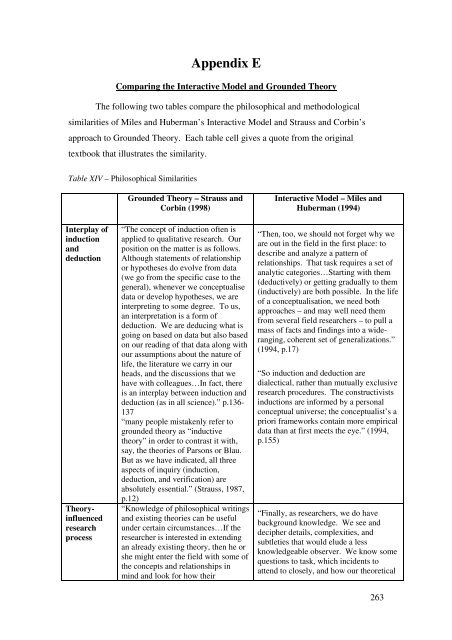DEVELOPMENTAL CRISIS IN EARLY ADULTHOOD: A ...
DEVELOPMENTAL CRISIS IN EARLY ADULTHOOD: A ...
DEVELOPMENTAL CRISIS IN EARLY ADULTHOOD: A ...
Create successful ePaper yourself
Turn your PDF publications into a flip-book with our unique Google optimized e-Paper software.
Appendix E<br />
Comparing the Interactive Model and Grounded Theory<br />
The following two tables compare the philosophical and methodological<br />
similarities of Miles and Huberman’s Interactive Model and Strauss and Corbin’s<br />
approach to Grounded Theory. Each table cell gives a quote from the original<br />
textbook that illustrates the similarity.<br />
Table XIV – Philosophical Similarities<br />
Interplay of<br />
induction<br />
and<br />
deduction<br />
Theoryinfluenced<br />
research<br />
process<br />
Grounded Theory – Strauss and<br />
Corbin (1998)<br />
“The concept of induction often is<br />
applied to qualitative research. Our<br />
position on the matter is as follows.<br />
Although statements of relationship<br />
or hypotheses do evolve from data<br />
(we go from the specific case to the<br />
general), whenever we conceptualise<br />
data or develop hypotheses, we are<br />
interpreting to some degree. To us,<br />
an interpretation is a form of<br />
deduction. We are deducing what is<br />
going on based on data but also based<br />
on our reading of that data along with<br />
our assumptions about the nature of<br />
life, the literature we carry in our<br />
heads, and the discussions that we<br />
have with colleagues…In fact, there<br />
is an interplay between induction and<br />
deduction (as in all science).” p.136-<br />
137<br />
“many people mistakenly refer to<br />
grounded theory as “inductive<br />
theory” in order to contrast it with,<br />
say, the theories of Parsons or Blau.<br />
But as we have indicated, all three<br />
aspects of inquiry (induction,<br />
deduction, and verification) are<br />
absolutely essential.” (Strauss, 1987,<br />
p.12)<br />
“Knowledge of philosophical writings<br />
and existing theories can be useful<br />
under certain circumstances…If the<br />
researcher is interested in extending<br />
an already existing theory, then he or<br />
she might enter the field with some of<br />
the concepts and relationships in<br />
mind and look for how their<br />
Interactive Model – Miles and<br />
Huberman (1994)<br />
“Then, too, we should not forget why we<br />
are out in the field in the first place: to<br />
describe and analyze a pattern of<br />
relationships. That task requires a set of<br />
analytic categories…Starting with them<br />
(deductively) or getting gradually to them<br />
(inductively) are both possible. In the life<br />
of a conceptualisation, we need both<br />
approaches – and may well need them<br />
from several field researchers – to pull a<br />
mass of facts and findings into a wideranging,<br />
coherent set of generalizations.”<br />
(1994, p.17)<br />
“So induction and deduction are<br />
dialectical, rather than mutually exclusive<br />
research procedures. The constructivists<br />
inductions are informed by a personal<br />
conceptual universe; the conceptualist’s a<br />
priori frameworks contain more empirical<br />
data than at first meets the eye.” (1994,<br />
p.155)<br />
“Finally, as researchers, we do have<br />
background knowledge. We see and<br />
decipher details, complexities, and<br />
subtleties that would elude a less<br />
knowledgeable observer. We know some<br />
questions to task, which incidents to<br />
attend to closely, and how our theoretical<br />
263
















